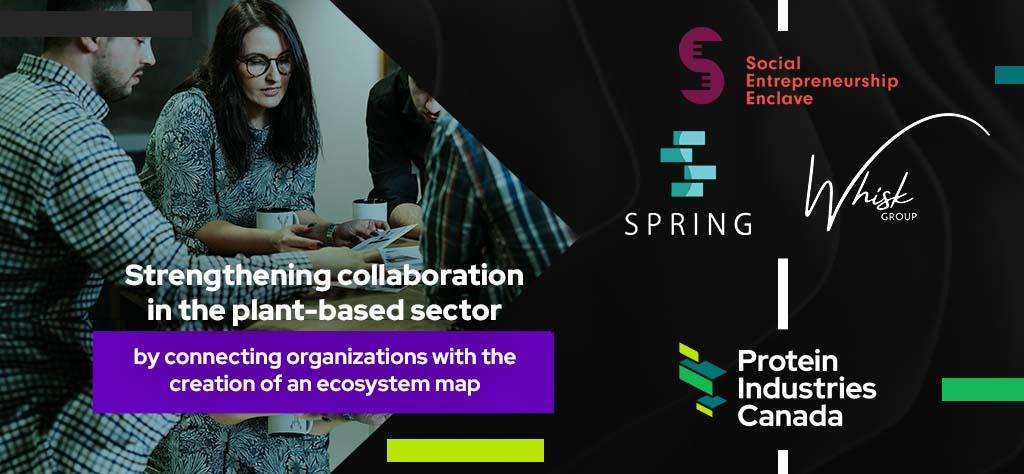New partnership will connect plant-based ecosystem and address capital challenges
- Posted:

Canada’s plant-based food and ingredients sector is vast, spanning provinces and sub-sectors. Finding and connecting everyone along the value chain can be difficult, but the benefits of doing so are plentiful.
Soon, a new ecosystem map will exist that will help better connect Western Canada’s plant-based companies. Led by the Social Entrepreneurship Enclave (SEE), Spring Activator and Whisk Labs, and with a co-investment from Protein Industries Canada, the creation of this ecosystem map will not only allow other companies to better understand their competitors and possible business partners, but also allow investors to better understand the companies they may wish to connect with.
“A connected plant-based sector is a strong plant-based sector,” said Protein Industries Canada CEO Bill Greuel. “By fostering an ecosystem that encourages collaboration, while still allowing for competition in the Canadian and global markets, Canada can reach its economic and sustainability goals faster and more efficiently. The ecosystem map being developed by SEE, Spring Activator and Whisk Labs will strengthen that connection and collaboration, helping Canada reach $25 billion in annual global plant-based sales by 2035.”
Once complete, the ecosystem map will be made available in a public-facing virtual format, allowing all interested parties to access it at their convenience.
"Canada is poised to be a global leader in the plant-based protein space," said Caroline von Hirschberg, co-CEO of Spring Activator. "This collaborative approach to ecosystem mapping will accelerate market connections, capital and the growing of the sector."
To elevate the connections made by the ecosystem map, the partners will follow its creation with a series of workshops. These workshops will first focus on addressing challenges and opportunities related to capital, scale-up and supply chains, followed by a series of workshops focused on meeting the needs of investors.
The partners hope that by focusing on both companies and investors, they can close the gap between the two sides of the capital coin, leading to an increase in investment in Canada’s plant-based food, feed and ingredients sector.
"Investors from across the globe are looking for potential investments in this innovative sector,” said Joel Sherlock, Whisk Group Co-Founder. “Our collective efforts to map these opportunities will improve access to capital and connections Canadian innovators need to scale well past our borders.”
As the ecosystem map grows and the workshop rolls out, the partners anticipate that Canada’s plant-based SMEs will not only have the opportunity to connect, but also scale their operations. This includes the sector’s Indigenous entrepreneurs, who are a particular focus of the Social Entrepreneurship Enclave. The successful scaling up of and increased investment into these companies will set the sector up for growth, allowing it to better meet Canada’s goal of becoming a global leader in the growing demand for plant-based protein.
“Those that face additional barriers to success because of who they are, like BIPOC entrepreneurs, can benefit from new industries and sectors that do not necessarily have the legacy colonial systems in place that form barriers to exclude their participation,” explained Joanna Nickerson, Co-Founder and Executive Director of SEE. “The plant-based protein sector, specifically, can gain from Indigenous entrepreneurs who hold Indigenous Knowledge around food and food systems. As such, we see this as a great opportunity.”
For more information about the ecosystem map as it becomes available, as well as workshop dates, please reach out to proteinresearch@seenclave.ca.
